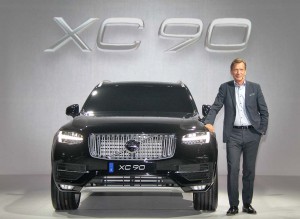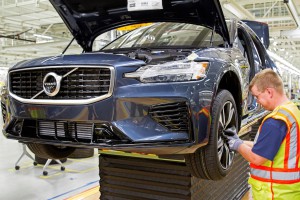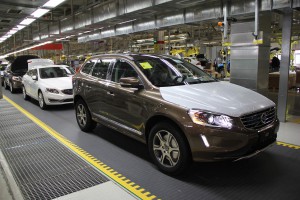
Volvo President & CEO Hakan Samuelsson said the tariffs implemented by the Trump administration are forcing a production slow down at its new Charleston, S.C. plant.
Volvo expects to slow the pace of expansion at its new factory near Charleston, South Carolina, due to the Trump trade war with China.
The move could impact how quickly the automaker expands production at the $1.1 billion plant, as well as the pace at which it brings on new workers. The workforce was expected to nearly triple, to around 4,000, by early in the coming decade with the addition of a second model at the plant. But some production now could be shifted to China, potentially having a long-term impact on plans for the factory.
Volvo issued an official statement Thursday noting, “trade issues may impact the pace of the expansion.” But in conversations with reporters at the Los Angeles Auto Show on Wednesday, Volvo’s global CEO Håkan Samuelsson took things further, indicating the production ramp-up will slow down.
President Donald Trump has enacted a number of new tariffs on Chinese imports. In turn, China has responded with higher duties on many American-made products, including cars. Ironically, while vehicles like an American-made Volvo S60 have seen tariffs jump from 25% to 40% since the trade war began, vehicles shipped to China from other markets, including Europe and Japan, now have had duties drop to 15%.
(Trump chides GM for plant closures, new Congresswoman blames Trump. Click Here for the story.)
Chinese-owned Volvo expected to eventually build as many as 150,000 vehicles annually in South Carolina once the current S60 sedan was joined by the next-generation XC90 sport-utility vehicle – with half of that output earmarked for export. The workforce, meanwhile, was expected to jump from the initial 1,500 to 4,000.

Volvo's new Charleston, South Carolina plant is being forced to ramp down production and limit hiring of new employees.
The comments made at the L.A. Auto Show indicate it could take Volvo longer to reach those targets, One of the big questions is whether Volvo might have to make more significant changes to its plans if the China trade war continues.
“We … thought Charleston could build cars for China,” Samuelsson told USA Today during a Wednesday interview. “That will not work.”
The automaker is now looking at the possibility of producing S60 sedans in China for that market, a move that would obviate tariffs entirely, even if the trade dispute were resolved entirely.
Volvo may yet have to factor in the possibility of a broader trade war, however, one that would be expected to have even more substantial effects on operations at the new factory. The U.S. Department of Commerce recently delayed a decision on whether to enact sanctions on automotive imports from a number of other markets, a move called for by President Trump who has called foreign-made vehicles a threat to national security.
But the former New York businessman is apparently not backing down. On Wednesday, he issued a tweet that said, “Get smart Congress,” and argued that “the countries that send us cars have taken advantage of the U.S. for decades.”
(Click Here to see how Trump’s trade war with China is impacting Volvo.)
Trade partners like the European Union have warned they would respond with tariffs of their own that could further weaken the ability of the U.S. to export automobiles.

Volvo may build more S60 sedans at its plant in China as well as XC90s expected to go to Charleston.
At the same time, virtually all vehicles sold in the American market would face higher costs, even those assembled in the States, because manufacturers would pay more for parts. That could translate into a hit of around $1,600 per vehicle for an American-made Toyota Camry, the automaker warned.
With an even higher level of foreign-made parts, vehicles produced at the new Volvo plant could see prices rise even more sharply.
Volvo isn’t the only automaker impacted by the Trump trade war with China, however. BMW has seen declining demand there for sport-utility vehicles made at its own South Carolina plant, and may transfer some production to China, as well. Despite that, Trump touted in a tweet offering evidence that the tariffs were working that BMW plans to open a second plant in the U.S.
The news appeared to catch BMW officials by surprise, who politely issued a statement essentially saying there is no second plant in the works right now.
(Volvo moves XC60 production to Europe from China to avoid tariffs. Click Here for the story.)
“We have talked for the past few years about an engine plant to support our North American production and sales and we are now again investigating this option,” BMW said in a statement. “In the future we will have the scale where a step like this may make business sense.”
